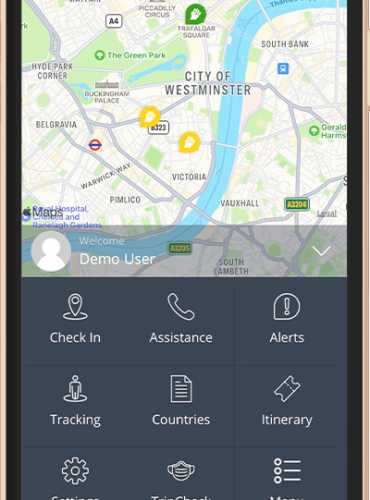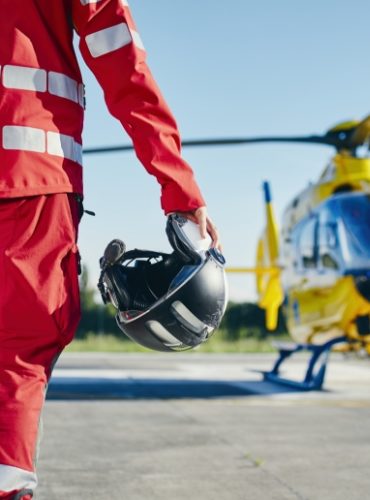Evacuations from High-Risk Locations Call +44 (0)1202 308810 or Contact Us →
LGBTQ+ Travel Risks 2023
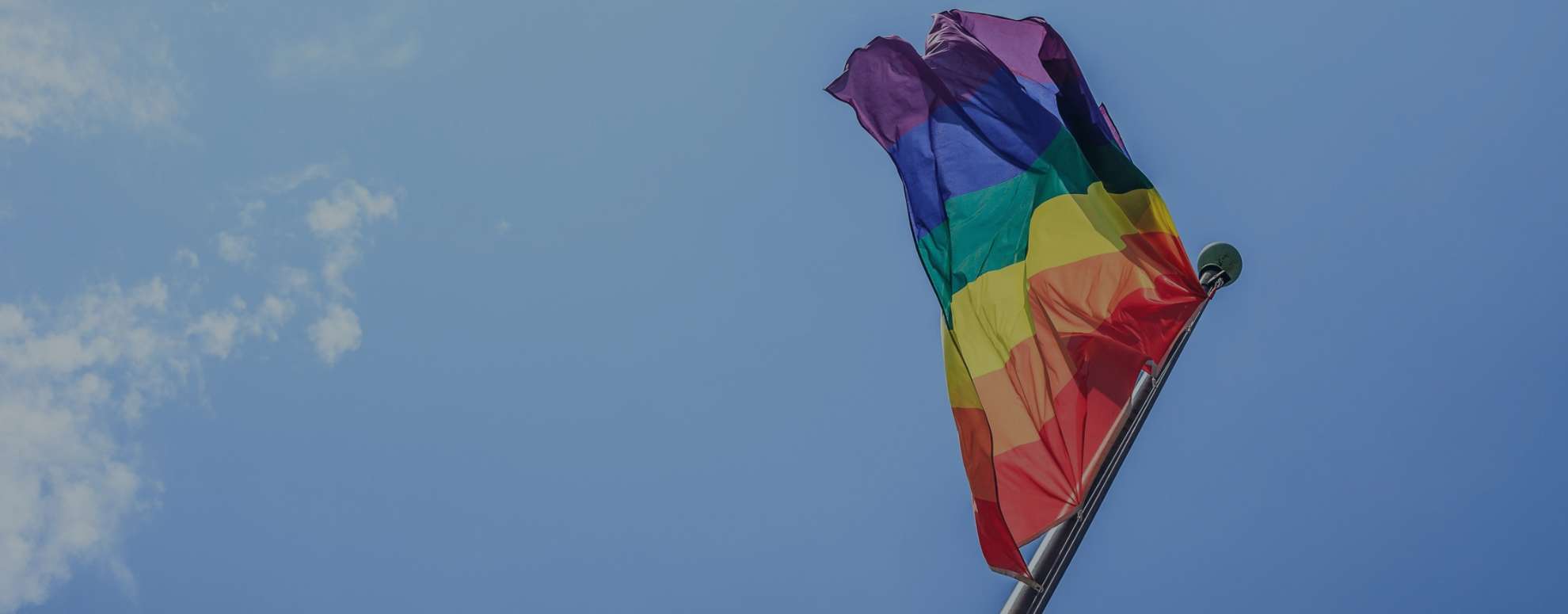
Duty of Care for LGBTQ+ business travellers in 2023
Increased risk for LGBTQ+ travellers can be overlooked. Whilst most Western and Western-orientated countries have an inclusive stance towards persons in the LGBTQ+ community, there remains a considerable number of countries with conservative or heteronormative cultures.
Within these, the legal regime or prevailing cultural practices are often hostile towards LGBTQ+ individuals. Such countries present an increased travel risk, which should ideally be reflected in corporate travel policies regardless of the prevailing culture in the destination and who is travelling.
This is the third annual edition which is designed to highlight some of the additional challenges LGBTQ+ people may face during travel. It offers advice for both LGBTQ+ persons and company risk managers on how to mitigate these risks. This report covers a broad spectrum of issues, however, as the risks faced by travellers are complex and wide-ranging, additional links are provided at the end of the report to explore this topic in further detail.
66%
No. of corporate travel programmes which fail to account for LGBTQ+ risks
Covered on this page:
- Progressive changes to LGBTQ+ rights in the last twelve months
- Regressive changes to LGBTQ+ rights in the last twelve months
- Creating inclusive business travel safety briefing
- Global overview of LGBTQ+ risks
- Travel considerations for LGBTQ+ employees
- Using LGBTQ+ Apps during business travel
- Business travel with a same-sex partner
- Business travel for employees with HIV/AIDS
- Socialising and networking guidance for LGBTQ+ business travellers
- Transgender specific travel guidance
Practical LGBTQ+ guidance for safer business travel
Download to share with your employees
Progressive changes to LGBTQ+ rights in the last twelve months
The last twelve months have seen several notable instances of progress being made across the world in terms of increasing acceptance of LGBTQ+ persons and issues. However, there have also been some high-profile instances of continued crackdowns on LGBTQ+ rights.
Since June 2022, several countries have continued to expand legal protections and frameworks for LGBTQ couples and individuals, such as same-sex marriages. Indeed, countries such as Slovenia, South Korea, Switzerland, and Andorra just to name a few have passed same-sex marriage or laws recognising the legality of same-sex relationships.
In the United States, to provide further protection for same-sex marriages, in December 2022, President Joe Biden signed the Respect of Marriage Act, codifying this right into federal law. In Mexico, some federal states have also legalised same-sex marriage within their territory, such as EdoMex, Tabasco, and Tamaulipas.
In tandem with this, the banning of conversion therapy has continued to occur across the world. In India, conversion therapy has been declared to be professional misconduct by the Medical Commission, whilst, in Cyprus, the government has outlawed the practice.
Finally, more countries have decriminalised homosexuality or LGBTQ+ and same-sex behaviours. Such decriminalisation occurred in the Cook Islands in April 2023, Singapore in November 2022, Barbados in December 2022, Antiqua and Barbuda in July 2022, and Saint Kitts and Nevis in August 2022.
Regressive changes to LGBTQ+ rights in the last twelve months
The last twelve months have also seen regressions of LGBTQ+ rights around the world, however, these have been concentrated in places which were already known to be hostile environments for LGBTQ+ individuals.
For instance, in May 2023, Uganda strengthened its anti-LGBTQ stance by passing the anti-homosexuality bill. This allows the use of the death penalty against those found guilty of “aggravated homosexuality”, or those found to be transmitting HIV/AIDS through same-sex relations. It also decrees a 20-year prison sentence for anyone found guilty of “promoting” homosexuality.
Russia
In Russia, in December 2022, President Putin further strengthened the laws banning the “propaganda of non-traditional sexual relations and the advocation of the denial of traditional family values”. Russia is also about to pass a law making gender-affirming surgery or transitioning illegal.
Alongside this, Russia’s state rhetoric against LGBTQ+ individuals has increasingly worsened with LGBTQ+ individuals regularly portrayed as “degradations of nature”, and “perversions”. More broadly in Russia, LGBTQ+ individuals and rights are now equated as being foreign agents who are working against Russia, whilst state-sanctioned homophobia has been used to justify the invasion of Ukraine.
Turkey
In Turkey, anti-LGBTQ+ rhetoric became a major talking point in the country’s recent election with Erdogan even vowing in his victory speech that LGBTQ+ individuals would never “infiltrate” his government. The United States has seen an estimated 491 bills targeting LGBTQ+ rights and freedoms proposed across the various states of the US. Texas alone has 53 such bills proposed.
Whilst southern and traditionally conservative states often have multiple such bills proposed, several more liberal states, have also seen such bills recently proposed. The net result of this is that the US-based Human Rights Campaign (HRC) declared a national state of emergency in the United States on LGBTQ issues.
Creating inclusive business travel safety briefings
Whilst many organisations are likely to employ some form of pre-travel safety briefing for their corporate travellers, these often focus on threats that are common to all travellers – such as petty crime, kidnap for ransom, and the risks emanating from unstable body politics and civil societies.
These pre-travel briefings, however, do not always occur, and if they do, they can often overlook the unique threats which can be posed to LGBTQ+ persons. Whilst not including such information in a pre-travel briefing may not breach UK law directly, it could well breach a company’s broader duty of care if appropriate mitigation measures aren’t suggested.
A first step towards creating a safe travel environment for staff members who may need this extra support is to make sure that everyone who is travelling receives pre-travel intelligence and is informed of the destination’s LGBTQ+ landscape. This is important because employers must be mindful that some individuals may not wish to be open about their sexual orientation or gender identity in the workplace, and employees may be hesitant about asking for further information on LGBTQ+ issues in their destination.
35%
The number of LGBTQ+ individuals who avoid disclosing their sexual orientation at work.
Risk intelligence with inclusivity for LGBTQ+ travellers
By including relevant information into every item of intelligence, one is not only being an inclusive employer – but it means that you are not also outing an employee who may not wish to otherwise disclose their gender or sexual orientation.
By including such information in all employee briefings, employers will demonstrate that they understand their duty of care to staff. They would also be demonstrating an understanding of the fact that whilst not all staff members who may be LGBTQ+ are publicly out for numerous reasons, they are still deserving of the same levels of support and care as those who are publicly out.
Alongside this, the briefing should allow for an employee to state that they do not wish to undertake this travel if it makes them feel uncomfortable. This disinclination, however, should not be taken as an indication of whether the employee is LGBTQ+ though.
If it were to be taken as such a statement, the company could risk breaching legislation surrounding equality in the workplace, especially if this unwillingness to undertake travel should lead to unfavourable treatment of the said individual.
If such a statement is made, a company should endeavour to see how this wish can be granted and work in partnership to find a resolution or a remedy. If a company were to willfully ignore this request and an LGBTQ+ individual travelled to a destination known to be hostile to them and consequently got into a legal dispute, then the company could be liable.
Resultingly, they would likely face considerable negative reputational impact, and would also likely be in breach of their duty of care obligations. Despite this, it must also be stated that when travelling an individual is bound by the laws of the country they are in, not the laws of the country they originate from.
Global overview of LGBTQ+ risks
While homophobia, transphobia, and other forms of discrimination can happen anywhere, laws and discrimination vary greatly between countries and regions. In some countries, anti-LGBTQ+ laws may remain on the statute books whilst society is broadly accepting of LGBTQ+ persons.
Alternatively, laws may ban discrimination based on sexual or gender identity yet it remains prevalent within society. This is the sort of granular information that should be provided to an employee before travel. It must be remembered that whilst a law remains on the statute books, even if rarely enforced, it is still a law and one could still be prosecuted under it.
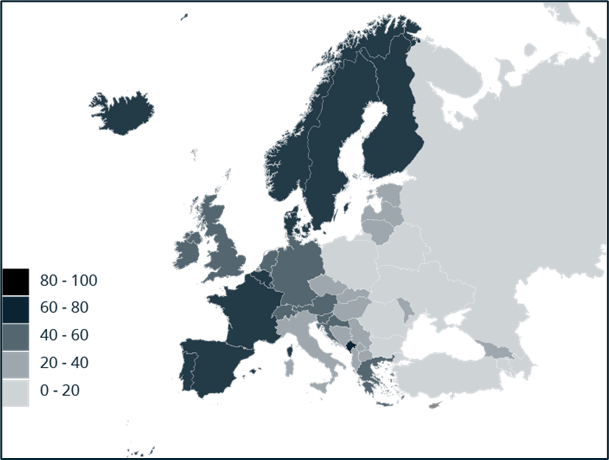
Europe
European countries are often seen as some of the most progressive and welcoming to those who are LGBTQ+, and indeed broadly speaking this is true. Despite this, there are several countries where societal acceptance of those who identify as LGBTQ+ is less than stellar. Figure 1 shows the level of equality for LGBTQ+ individuals across Europe.
It must be noted that whilst equality does not necessarily map fully with societal acceptance, the two share a large degree of convergence.
Western and Eastern Europe Differentiations
There remains a clear and present divide between Western and Eastern Europe when it comes to the social acceptance of LGBTQ+ individuals. Russia remains a clear and present outlier with its restrictions and hostility to LGBTQ+ rights.
However, there remain both legal and societal issues in Eastern Europe as well. For the fourth year running, Poland remains the worst EU country to be LGBTQ+ in with virtually no legal protections. Fellow EU members, Romania and Bulgaria, are not far behind.
It should be noted that as a result of the Russian invasion of Ukraine, LGBTQ+ individuals in the country have stronger legal protections than those found in Poland or Romania. This is as Kyiv has strengthened legal protections for LGBTQ+ individuals after Russia has weaponised homophobia, and also as a result of viral footage of LGBTQ+ Ukrainian fighters performing well on the battlefield.
Finally, the strengthening of such protections further allows Kyiv to align itself closer to the EU and the wider Western world.
On the whole, travellers in much of Western Europe who are LGBTQ+ should face little official discrimination and should encounter broad acceptance from society. In Eastern Europe, the Balkans, and the Caucasus regions, overall there is little legal equality, and societal acceptance may vary. Residents in the major cities in these areas may be more accepting and welcoming of LGBTQ+ travellers – however, unlike their Western European counterparts this acceptance may be the minority viewpoint.
Middle East and Africa
The Middle East and Africa are home to many of the countries which enact the death penalty towards those accused of homosexual actions. This is illustrated in Figure 2. Israel, however, is considered to have the most developed LGBTQ+ rights framework in the Middle East – with the nation banning discrimination on the grounds of sexual orientation in 1992. Tel Aviv, its capital, meanwhile is often ranked as one of the world’s most LBGTQ+ friendly cities.
Due to long-standing political hostility towards LGBTQ+ rights and the influence of religion across the region, Africa is the only continent where younger generations are often as intolerant as past generations when it comes to LGBTQ+ matters. Despite this, progress continues to be made. For instance, in Kenya, the supreme court has ruled that LGBTQ+ groups and individuals are protected by the constitution, despite other domestic laws restricting same-sex intimacy.
Alongside this, May 2023 saw the Supreme Court of Namibia rule that same-sex marriage must be legally treated equitably to heterosexual marriages. The recent anti-LGBTQ+ legislation in Uganda, which brings back the death penalty for those found guilty of breaking the law underscores more widely the legal and cultural hostility which can often greet openly LGBTQ+ individuals in the region.
South Africa, whose post-apartheid constitution was the first in the world to outlaw discrimination based on sexual orientation, remains the only major African country where LGBTQ+ people enjoy constitutional and statutory protections from discrimination in employment, the provision of goods and services, and many other areas, and where crucially, society is broadly accepting of LGBTQ+ persons and the anti-discrimination laws. Despite this, outside South Africa’s major urban areas, residents may well be more conservative and less welcoming.
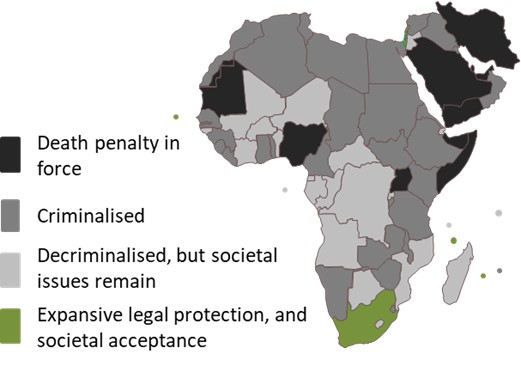
Complexities in LGBTQ+ acceptance across Africa and the Middle East
Across both Africa and the Middle East, the acceptance of LGBTQ+ individuals is complex. In many countries they have a legal right to exist, however, due to prevailing cultural and social factors they often face widespread discrimination – which can culminate in extra-judicial killings and beatings, with the law providing little to no recourse. Indeed, whilst many states no longer enforce the death penalty for those accused of LGBTQ+ crimes, extra-judicial executions and honour killings around LGBTQ+ issues are extremely common, and often the perpetrators of these killings face no consequences.
This is as the justice system or society may tacitly approve of this action. States such as Iraq, Libya, and Syria are all known to have “sanctioned” extra-judicial killings, whilst across the Middle East and Africa, insurgent groups such as Boko Haram, regularly conduct “gay purges” and LGBTQ+ killings in the territory over which they exercise control, often in the absence of the state.
In a number of these countries, these laws do not just target those who are LGBTQ+. They have also been used to arrest and deport those who openly support LGBTQ+ rights, or those who do not fit into pre-conceived gender and sexual stereotypes – such as men who are deemed “too effeminate”, or ladies who wear “masculine clothing”.
As a result of these factors, and the number of nations which still use the death penalty as punishment for those accused of LGBTQ+ crimes, it is recommended that LGBTQ+ travellers remain extremely careful when travelling to the Middle East and Africa. They should avoid all overt displays of affection or other actions which could compromise safety. It is also recommended that those who are not LGBTQ+ but are allies, or those who cross preconceived gender norms also be careful about how they present and what they say whilst travelling.
North America and The Caribbean
Many nations in the region have decriminalised LGBTQ+ issues, however, due to conservative societies and religious influence, there can be outward hostility to gay or transgender individuals, including verbal abuse and physical attacks. This often manifests itself as violent crime against transgender persons, and openly gay and lesbian individuals.
As a result of this, it is recommended that the individual locality to which travel is planned is researched fully. Furthermore, it must be noted that across the United States, whilst a state may be known for its over-arching LGBTQ+ hostility, the situation can often change on a county-by-county and city-by-city basis. Whilst many nations and regions across North America and the Caribbean may have some form of legal protection in place, the prevailing social attitudes may differ greatly, indeed it may run counter to the prevailing laws.
In the Caribbean, the year has seen several countries repeal their legal bans against same-sex marriage, however, there have also been retrenchments. In Bermuda and the Cayman Islands, both British Overseas Territories, the Privy Council of the United Kingdom ruled that legislation in both territories which limited marriage between men and women was not unconstitutional. LGBTQ+ activists in both nations were basing their legal cases for same-sex marriage on the fact that this restriction was indeed unconstitutional. Meanwhile, other countries in the region have seen no change whatsoever.
As a result, members of the LGBTQ+ community can face negative attention and harassment throughout the Caribbean. Whilst Caribbean islands which are overseas territories or departments of European nations have better conditions for LGBTQ+ travellers and residents, the recent rulings by the UK privy council highlight that such a state of affairs can not be guaranteed.
The United States is unique in that it is whilst there are some nationwide protections against discrimination, there is no federal law that bans discrimination based on sexual orientation or gender identity in public. Instead, many states have legal measures in place to protect the rights of the LGBTQ+ community.
This does not, however, extend to the more conservative American states, where local laws or ordinances can greatly threaten the protection of LGBTQ+ individuals. In the last twelve months, republican controlled states, and even election candidates have begun to implement or espouse increasingly anti-LGBTQ+ legislation. For instance, in Florida, republicans introduced 20 bills into the state assembly to roll back the rights and protections of the state’s LGBTQ individuals in one day.
Already, the number of anti-LGBTQ+ laws passed at the state level so far in 2023, 29, is higher than the number passed across the entirety of 2020. This state-wide upsurge is partially a result of the lobbying success of America’s powerful network of Republican-aligned religious groups. Due to the complex nature of LGBTQ+ rights in the United States, each state should be considered when researching the risk landscape. Canada is seen as having some of the most robust protections and policies in place for both residents and travellers who are LGBTQ+.
Latin America
Latin America remains a leader on the whole in the LGBTQ+ rights movement. Several countries in the region, notably Brazil, have some of the strongest and most progressive laws and protections for LGBTQ+ people in the world. Despite this, due to a variety of socio-economic issues, the region is also home to some of the world’s worst rates of violence against LGBTQ+ people. Alongside this, the last twelve months have seen a return to power of right wing highly religious parties.
Resultingly, as of August 2022, at least ten Latin American countries have begun advancing initiatives that could fuel further violence against trans and gender-diverse people.
Latin America, due to socio-economic conditions is one of the world’s more violent regions, and as a such it also sees elevated rates of structural violence directed at its LGBTQ+ community. For example, Brazil was for the 14th consecutive year running named the country with the highest number of transgender individuals killed. Meanwhile, 2022 saw an increase in the number of hate-crime murders committed against LGBTQ individuals in Argentina.
Whilst the underlying fundamentals shaping the region have not changed over the last twelve months, there have been some more optimistic developments in the region, which underscore the fact that some progress at least at an institutional level has been made.
For example, the Cuban government passed a gay-marriage bill in October 2022 after a majority of voters approved of this step in a national referendum. In doing so, it became the 9th country in the region to do so.
Meanwhile, the government of Honduras admitted responsibility for the state-sanctioned murders and brutalisation of a trans-activist in 2009, whilst the government of Peru was found liable for the brutalisation and institutional sexual assault of a trans-activist in 2008, by the Inter-American Commission of Human Rights.
These are notable victories for the LGBTQ community as both Peru and Hondurus tend to state inertia when it comes to LGBTQ+ issues.
Meanwhile, in Brazil, the last twelve months saw the electoral defeat of President Jair Bolsonaro, the most openly homo- and transphobic president of recent times in the region.
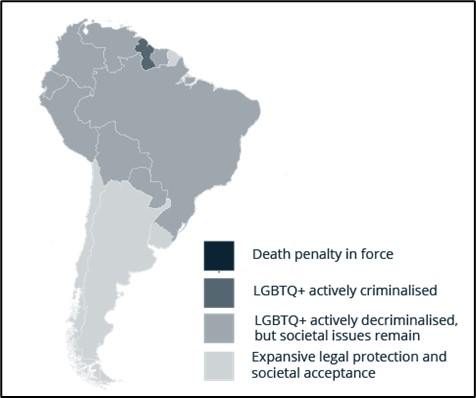
When travelling around the region, be mindful of the fact that whilst legally protected in almost every state, there are high levels of violence against LGBTQ+ persons and that whilst the region’s major cities such as Rio de Janeiro, Buenos Aires, and Bogota, will be safer than more rural areas, the generally high rates of crime, and high rates of LGBTQ+ specific crime mean that incidents could still occur.
Asia & Oceania
Laws across Asia and Oceania are mixed. In Oceania, the major states such as Australia and New Zealand are viewed as widely tolerant and respectful of LBGTQ+ individuals and are often ranked as being as safe.
In Asia, the region is seeing a rapid evolution of both legal and societal acceptance of LGBTQ+ individuals. Taiwan is seen as the most accepting nation in the region of LGBTQ+ individuals. However, socially, it remains relatively conservative, and caution is still advised. Despite the progress made across this region, it is home to three states which still have the death penalty on the statute books for those accused of being LGBTQ+ (mainly homosexual) activities; Afghanistan, Brunei, and Pakistan. Many states in recent years have begun to enact legal protections for LGBTQ+ individuals and strike down laws which discriminated against them.
Progress on this remains patchy, however, there have been some notable events in the last twelve months. In November 2022, Singapore repealed law 377A which criminalised same-sex actions between men. Meanwhile, in Japan which remains the only G7 nation not to allow same-sex marriage, courts have ruled twice now that this is unconstitutional placing further pressure on the country’s government to change this. In South Korea, meanwhile, a court has recognized the rights of a same-sex couple in the country by ruling that they should be entitled to the same benefits as their same-sex counterparts in the country’s National Health Insurance Service.
LGBTQ+ travel risks in China
In the last twelve months, the restrictions on the country’s LGBTQ+ community have continued to tighten in China. This has been symbolised recently by the closure of the Beijing LGBTQ+ centre in May 2023. The centre was one of China’s most high-profile community spaces for both the domestic and visiting LGBTQ+ community. The closure of this centre was preceded by the news that two students at Beijing’s Tsighua University were “severely disciplined” and “re-educated” for distributing pride flags on campus. According to their hearings, they violated rules around “distributing unauthorized promotional materials” thus creating a “ harmful influence” whilst not “heeding dissuasion”.
Increasingly, under President Xi Jinping, the authorities see LGBTQ+ rights and LGBTQ+ individuals as being a “Western import” designed to undermine traditional Chinese values. In tandem with this, the LGBTQ community is seen as a threat to the power of the CCP because it generates loyalty from those within it. These latest restrictions come on top of those which were first put into operation in 2022 which saw the authorities granted permission to arrest those deemed showcasing “abnormal gender aesthetics”, this meant men deemed to be showcasing feminine attributes, or ladies showcasing masculine traits.
LGBTQ+ travel risks Tokyo, Seoul and beyond
Across the region, a major issue for those who identify as LGBTQ+ is the fact that one’s identity might be exposed and harm educational and career opportunities. This is as much a fear in the major metropoles of Tokyo and Seoul, as it is in some of the region’s smaller more conservative towns and cities. Alongside this, much as in Africa and the Middle East, there are several countries where extra-judicial and honour killings of LGBTQ+ persons are common. As a result of this complex interplay between societal norms and politics, if travelling in the region outside of Australia and New Zealand, discretion regarding LGBTQ+ identity is advised.
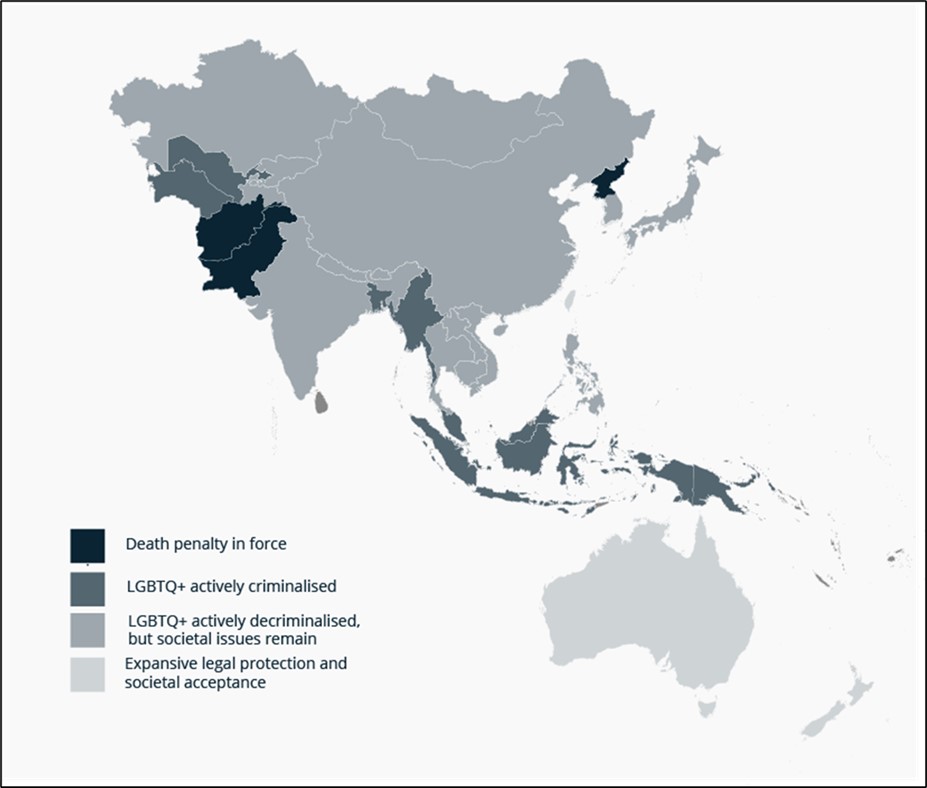
Legal status of the LGBTQ+ community across Asia and Oceania
Travel considerations for LGBTQ+ employees
Many nations that are frequent destinations for international business trips, or have large domestic populations, are also those which have some of the harshest restrictions and laws in place discriminating against those who identify as LGBTQ+. As such, travel considerations which are unique to the LGBTQ+ traveller are set out below.
In addition to understanding the considerations and recommendations outlined below, travellers should also be made aware of the cultural and legal climate towards LGBTQ+ persons in their destination. This is because the first step to mitigating the threat that LGBTQ+ travellers can face is through a thorough understanding of those threats.
Whilst in country, it is often best to avoid discussing LGBTQ+ topics, despite one’s feelings on the matter. Whilst travelling, disclosing personal and sensitive information with strangers increases the risk of harassment. LGBTQ+ individuals should be careful with how much information they reveal. In more restrictive societies, overt display of attention (even between heterosexual couples) continues to be frowned upon and, as such, should be avoided.
Non-native privilege
Most travellers from the Western world are often able to travel with a certain “protective privilege” due to not being residents of that country. Instead, they are often perceived as coming from a wealthy country. This can mean that a non-native LGBTQ+ traveller may well be largely shielded from the regular discrimination which may affect everyday residents in the country. If on a long business trip, you decide you wish to seek out local LGBTQ+ individuals and spaces, it would be wise to think not only about your safety but the safety of those around you. Local LGBTQ+ communities and residents tend to suffer harsher and more severe consequences and punishments than visiting travellers, sometimes as severe as execution. Discretion helps maintain not only your safety but also the safety of the local community.
In several countries where the existence of LGBTQ+ persons, and their community isn’t explicitly banned by the authorities, you should still take care if you decide to interact with the local community. Whilst your status as a non-resident may protect you from the harsher extremes of intolerance, that protection may not be “automatic,” and it also will not apply to anyone you meet. Whilst you may be able to fly out of the country, this option may not be feasible for local nationals. Indeed, some communities may not even welcome the extra spotlight that a non-resident may bring to their community. It is unlikely that a business traveller who is travelling for two or three days will look to connect with the local community. However, if you are seconding an employee to an overseas office for a prolonged period, this is a scenario that becomes much more likely.
46%
The number of LGBTQ corporate travellers who go back “into the closet” when travelling.
Using LGBTQ+ Apps during business travel
Due to the historical societal intolerance of LGBTQ+ individuals around the world, LGBTQ+ individuals have come to rely on discrete methods of communicating with and meeting each other. This includes in recent years the widespread adoption and use of cruising and dating apps. These are used freely and frequently by LGBTQ+ persons around the world, however, in some areas of the world, they come with associated risks.
Simply put, in countries where there are restrictions on LGBTQ+ life, there are also almost certainly digital restrictions on mobile applications.
Well-known apps and sites used by the community for anything from friendships to romantic encounters are often banned by national governments. Where these apps are illegal, travellers should not use them.
If you are caught using such apps, even via the use of VPNs, you can face charges. Some countries even criminalise the use of VPNs and so one could be open to multiple charges of illegal activity.
Furthermore, in the more repressive countries, there are reports that members of the secret police often use such apps to entrap users, before then assaulting them, arresting them and punishing them for breaking the law. As such, it is advisable that before travelling all personal electronic devices are screened to ensure that these apps (if used) are not on the devices being taken with you.
Using LGBTQ+ apps in countries with low societal tolerance
In countries where there may be few legal restrictions, but high societal intolerance, the use of such applications may be legal but could still pose a danger to individuals. There have been reports of far-right or anti-LGBTQ+ groups using such applications to lure users into meetings, where they are then assaulted and often killed or left for dead. Alternatively, both government officials and anti-LGBTQ+ groups have been known to use information gleaned from such applications for blackmail and coercion purposes.
These dangers exist across the world but are heightened in environments we are unfamiliar with. Therefore, it is advised that you employ caution or simply avoid using such applications during travel. If employees are determined to use such apps whilst travelling, basic precautions should be taken, such as never agreeing to meet in private residences or secluded areas, meeting first in a public setting, somewhere you can leave easily. If something feels wrong, trust your instincts.
36+
Countries or territories block or censor LGBTQ+ content.
Business travel with a same-sex partner
Considerations also extend beyond the individual. If taking your partner with you on a trip, either for leisure or allowed by your company on a business trip, some locations will require serious consideration. Would travelling with a same-sex partner be an appropriate and safe thing to do? Could it jeopardise your and your partner’s safety on the trip? If you do decide that you wish to travel with your partner, then other considerations come into play. If needing to apply for a visa, it may well be easier to apply for two separate visas given many countries do not recognise same-sex partnerships or cohabitation. Furthermore, LGBTQ+ couples may have to reserve a room with two beds, instead of one, or even reserve two different rooms to remain discreet or even to avoid legal action.
Business travel for employees with HIV/AIDS
HIV/AIDS does not solely afflict those in the LGBTQ+ community, however, males within the LGBTQ+ community have a much greater chance of being infected with HIV/AIDS than their heteronormative counterparts.
New research shows that by 1995, HIV/AIDS had killed 10 percent of self-identifying gay men in the United States, having only been first identified fourteen years prior in 1981. Today, globally, men within the LGBTQ+ community are 25 times more likely than average to contract HIV, according to research published by UNAIDS. As a result of this strong correlation, and the historical perspective of HIV/AIDS as being a “disease of gay and bisexual men”, HIV/AIDs and LGBTQ+ issues are closely intertwined.
Data from the UN shows that at least 48 countries impose HIV/AIDS-related restrictions or enforced testing, which often result in those who are positive being barred from legally entering, transiting, working or residing in the country. Most countries which discriminate based on HIV positivity do so when it comes to longer-stay visas, however, some also discriminate when it comes to short-stay visas also.
Restrictions for business travellers with HIV/AIDS
The following map shows the countries where HIV/AIDS travellers may face restrictions on travel due to their health status. It should be noted that just because a country may not have any legal barriers against travellers with HIV/AIDS from travelling to the country does not mean that if a disclosure is made or is subsequently found out, you will not face discrimination. It must also be noted that some countries will deport or arrest individuals if the authorities discover a falsified HIV status. Other countries may have a voluntary declaration section when it comes to HIV/AIDS, it is often best to not declare one’s status as this will lessen the chance of any discrimination occurring.
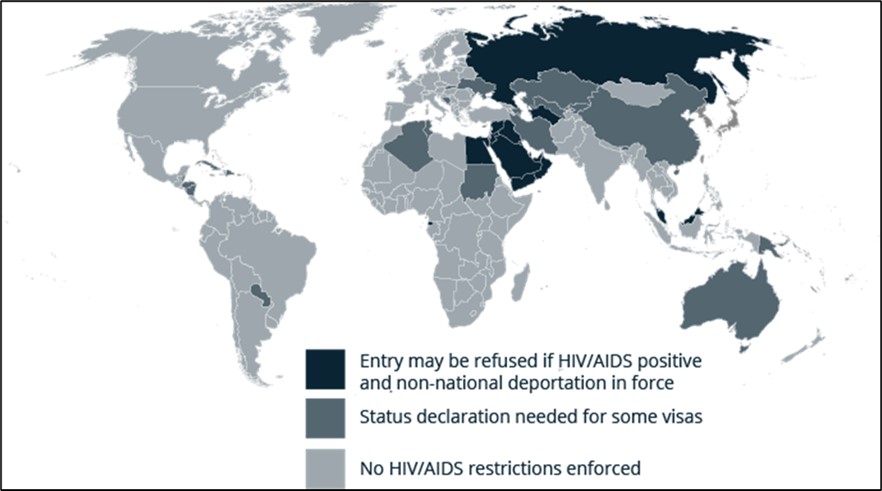
Global restrictions on travellers with HIV/AIDS
As more and more people are placed on antiretroviral medication (for those who have been exposed to HIV), there are an increasing number of people who are known in health circles as U=U (Undetectable = Untransmissible). This means that whilst they will test positive for HIV if they continue to take their medication then they will have so little of the virus within their system they are no longer infectious carriers. Despite being no longer infectious and having an undetectable amount of HIV in their systems, they will still test positive when tested for HIV/AIDS.
Travelling safely whilst taking PREP medication
In Europe and North America, there are also an increasing number of LGBTQ+ individuals on a medication called PREP, pre-exposure prophylaxis. This medication has in recent years been given to as many men within the LGBTQ+ community as possible, in recognition of their heightened risk of catching HIV. When taken daily, this medication reduces the risk of catching HIV by 99 percent. Whilst taking this medication does not necessarily equate to an individual being LGBTQ+, there is currently a very strong implied correlation.
Those who are on medications such as antiretrovirals and PREP should follow general guidelines around taking medications abroad. This includes taking any accompanying documentation for the medication, such as the medication’s original packet/bottle, showing the name of the person carrying the medication and medication details. However, you could also have a letter from the prescribing doctor confirming that the medication is necessary during the trip. This will help to minimise any problems at border control. Such documents and letters do not necessarily need to mention HIV suppression or prevention – any such documents simply need to prove that the medications are being carried for a chronic medical condition and that they are for personal use.
If one is travelling to a state which is not hostile to those with HIV or those of an LGBTQ+ identity, and there are no restrictions regarding people with HIV entering the country, it may help to have a clear letter from your doctor which says that the medications are for HIV. Such clarity can sometimes help to speed up any questioning by customs or border officials.
It is worth remembering that due to the links between HIV and LGBTQ+ issues, plus the fact that several countries deport those who are HIV positive, being found with HIV drugs may result in deportation in certain countries. In others, carrying such medicines may simply mean that you are seen as part of the LGBTQ+ community and as such may face discrimination that travellers without HIV medication would not. Medically speaking, it is never advisable to take a break from medication prescribed to prevent or suppress HIV. This can risk developing resistance to drugs, being more vulnerable to health problems in the future and – if travellers have a low CD4 cell count –becoming ill whilst not taking your treatment. If a break is particularly prolonged, it could ultimately lead to infections progressing to AIDS.
Socialising and networking guidance for LGBTQ+ business travellers
If conducting business in a country that is known to be hostile to your orientation, the need for an individual to hide their orientation can be draining and anxiety-inducing. Indeed, 95 percent of LGBTQ+ respondents to a survey on international business travel indicated they had “gone back into the closet” whilst on business travel.
Being able to politely evade questions about marriages, partners and children may all be easier to do during working hours on business travel. However, it can often become much more difficult to evade such questions when socialising or networking after business hours. Further to this, the addition of more informal locations coupled with alcohol can all contribute to a lowering of an individual’s sense of awareness. Due to these issues, it is often understandable that many LGBTQ+ business travellers prefer to skip such after-hours events or only attend them for a tokenistic amount of time.
Skipping such events can often be seen as rude or can even raise questions. As such, it is common for individuals to claim jetlag or tiredness after travel. A common tactic used by LGBTQ+ travellers is to say they are meeting up with an old friend who lives in the area.
However, sometimes socialising and building relationships is a vital part of business travel, and it is therefore advised that individuals limit their alcohol intake (good advice regardless of sexual orientation when on a business trip or in an unfamiliar location), as well as being as vague as possible in response to personal questions. Alternatively, having a set of prepared stock answers you can resort to if necessary, is also strongly recommended.
Transgender specific travel guidance
Those whose gender is different to the information recorded in their identity or travel document can experience challenges even before arrival in their destination country. For example, official documents that do not reflect the biological gender of a person can be rejected at border controls.
Additionally, transgender or gender non-conforming travellers can also be challenged by lengthy security checks and systems that are designed for a binary society.
Transgender travellers may have to face the decision as to whether to disclose the fact that they are transgender. If disclosure must occur when to reveal such a fact and to whom can often be a daunting task. Airport security scanners are notorious for registering body contours not typical for a person’s gender as anomalies. Transwomen who have not had gender affirmation surgery are often “outed” by such airport scanners. So too are transgender persons who use prosthetics or binders on their bodies.
21%
The number of Transgender travellers who encounter issues when flying.
Transgender travellers may have to face the decision as to whether to disclose the fact that they are transgender. If disclosure must occur when to reveal such a fact and to whom can often be a daunting task. Airport security scanners are notorious for registering body contours not typical for a person’s gender as anomalies. Transwomen who have not had gender affirmation surgery are often “outed” by such airport scanners. So too are transgender persons who use prosthetics or binders on their bodies.
Such a scenario is likely to be particularly uncomfortable for a transgender traveller. If you can have a quiet and polite word with the security officials, the situation can often be resolved professionally and courteously.
If you need to be searched or patted down, many nations will match the gender of the searcher to your outward gender presentation. Jurisdictions increasingly recognise ‘X’ as a legal gender marker alongside ‘M’ and ‘F,’ offering an alternative to those whose gender identity falls outside the traditional male/female binary. Border officials in states which are progressive and tolerant around LGBTQ+ rights will likely be trained and knowledgeable about the X gender marker.
However, if travelling outside these states on a passport with an X gender marker you may well encounter difficulties as officials may not have encountered the X marker and may wish to question you.
The lack of awareness around gender identity, gender presentation and sexual orientation can cause distress or affect the safety of travellers.
A series of measures can be adopted to reduce the risk:
- Update your travel documents if possible. Individuals may not be able to change gender markers on their IDs based on self-determination. In most countries, only after gender-affirming medical interventions can individuals change the information on their identification documents.
- Make sure to have comprehensive travel insurance. Insurance should cover costs should an emergency occur. Across the world, insurance companies increasingly have bespoke packages for LGBTQ+ travellers inclusive of policies and advice tailored to their needs.
- Pack medical items in a toiletry kit, resealable plastic bag, or a hard case and keep them on your person with proof of prescription.
- If travelling with syringes these need to be declared to airport officials so that they can be inspected.
- Travellers should make sure that when making reservations, flights and hotels are booked with the same name, gender, and birthdate as the ID you plan to travel with and that it all matches. For some, this may involve having to use a dead name.
- Carry supporting documents. To facilitate the screening process, travellers that have recently undergone medical treatment can obtain a letter from their health provider stating the change in appearance.
- If you travel frequently to the United States, then enrolling in one of the TSA schemes such as Global Entry may be an option. Such schemes expedite screening at airports, for transgender persons this may mean less invasive pat-downs and body scans. Other nations may have similar programmes for frequent travellers.
Practical LGBTQ+ guidance for safer business travel
Download to share with your employees
Risk management solutions for global ambition
Download the LGBTQ+ business travel guide
Practical advice for travellers in the LGBTQ+ community


